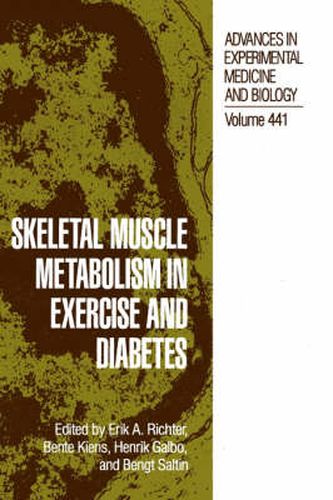Readings Newsletter
Become a Readings Member to make your shopping experience even easier.
Sign in or sign up for free!
You’re not far away from qualifying for FREE standard shipping within Australia
You’ve qualified for FREE standard shipping within Australia
The cart is loading…






This title is printed to order. This book may have been self-published. If so, we cannot guarantee the quality of the content. In the main most books will have gone through the editing process however some may not. We therefore suggest that you be aware of this before ordering this book. If in doubt check either the author or publisher’s details as we are unable to accept any returns unless they are faulty. Please contact us if you have any questions.
The Copenhagen Muscle Research Centre was founded in 1994 with the support of a grant from the Danish National Research Foundation. Among the goals for the Centre is the organization of research symposia, with the aim of bringing a limited number ofintemation ally renowned scientists together to discuss the latest developments and perspectives in their field. The first Copenhagen Muscle Research Centre Conference was held in 1995 and dealt with cardiovascular regulation. The Second Copenhagen Muscle Research Centre Confer ence was held from October 23-26, 1997. The topic of the Symposium was Muscle Metabo lism: Regulation, Exercise, and Diabetes. Seventy invited scientists from all over the world discussed their latest research related to skeletal muscle metabolism. The speakers were asked to expand on their presentations and to write short, but comprehensive, chapters about their given topics. The result is 28 peer-reviewed and edited chapters covering many if not all aspects of muscle energy metabolism related to exercise and diabetes. Emphasis is on regulation of glucose and fatty acid metabolism and the mechanisms regulating their use as fuels for the muscle during exercise. In addition, abnormalities in the regulation of glucose metabolism in the diabetic state are described. However, amino acid and protein metabolism are also thoroughly discussed. We believe that this volume brings an unparralleled, up to date, and comprehensive review of the frontiers in muscle metabolism. Erik A.
$9.00 standard shipping within Australia
FREE standard shipping within Australia for orders over $100.00
Express & International shipping calculated at checkout
This title is printed to order. This book may have been self-published. If so, we cannot guarantee the quality of the content. In the main most books will have gone through the editing process however some may not. We therefore suggest that you be aware of this before ordering this book. If in doubt check either the author or publisher’s details as we are unable to accept any returns unless they are faulty. Please contact us if you have any questions.
The Copenhagen Muscle Research Centre was founded in 1994 with the support of a grant from the Danish National Research Foundation. Among the goals for the Centre is the organization of research symposia, with the aim of bringing a limited number ofintemation ally renowned scientists together to discuss the latest developments and perspectives in their field. The first Copenhagen Muscle Research Centre Conference was held in 1995 and dealt with cardiovascular regulation. The Second Copenhagen Muscle Research Centre Confer ence was held from October 23-26, 1997. The topic of the Symposium was Muscle Metabo lism: Regulation, Exercise, and Diabetes. Seventy invited scientists from all over the world discussed their latest research related to skeletal muscle metabolism. The speakers were asked to expand on their presentations and to write short, but comprehensive, chapters about their given topics. The result is 28 peer-reviewed and edited chapters covering many if not all aspects of muscle energy metabolism related to exercise and diabetes. Emphasis is on regulation of glucose and fatty acid metabolism and the mechanisms regulating their use as fuels for the muscle during exercise. In addition, abnormalities in the regulation of glucose metabolism in the diabetic state are described. However, amino acid and protein metabolism are also thoroughly discussed. We believe that this volume brings an unparralleled, up to date, and comprehensive review of the frontiers in muscle metabolism. Erik A.